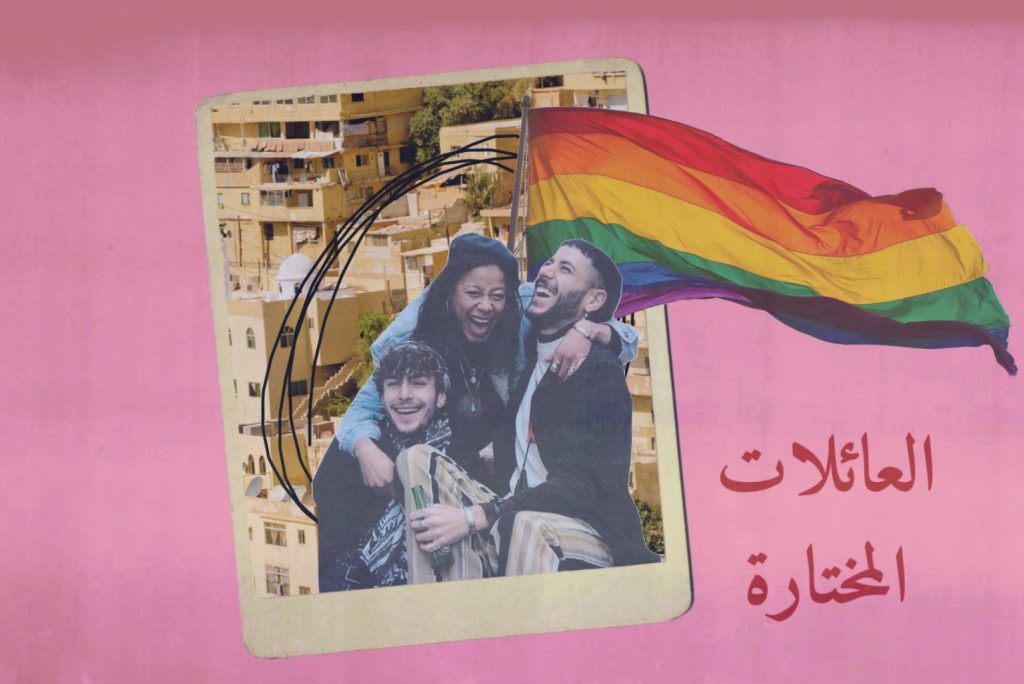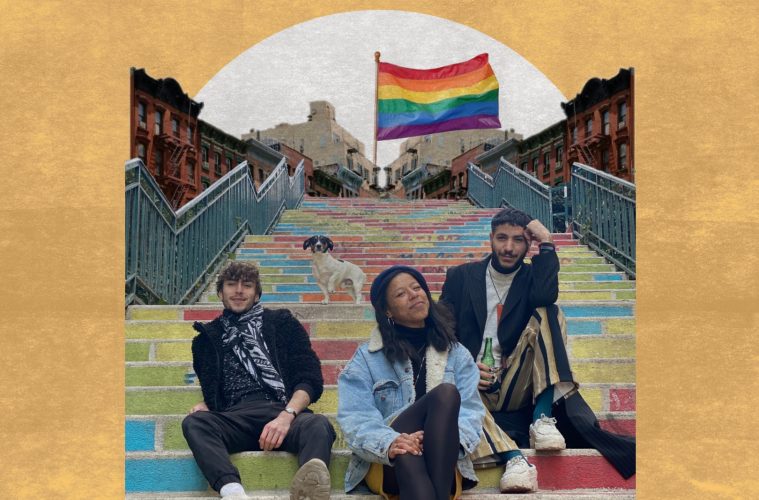Words by Lara Bellone
Photographed by Khkaidan (of Khkaidan‘s chosen family with Sabry mansouri, Clément Peroux and Fanny Etilopy)
Design by Lina A.
This article is part of the “Hopefully Tomorrow” issue
One late evening in Sousse, Tunisia, Chedli found himself in a crowded apartment full of strangers. He had just finished his first year of university and was invited by his only gay friend to a birthday party. Walking in as the new person, Chedli was met by curious stares from everyone. Suddenly, the birthday boy entered the room in a wedding dress with his ‘mother’ crying for joy beside him. The crowd erupted in celebration at the entrance of the ‘bride’ in the mock wedding. Chedli met many people from the LGBTQ community that night, including Shayma, who would become his future chosen sister. “Humans are like independent Lego pieces; once two people click together, you decide to continue building the relationship. Shayma and I clicked.” Little did Chedli know that his first gay birthday party would be the beginning of finding his future chosen family.
A chosen family consists of relationships between individuals who provide unconditional support to each other due to a void in biological families. Being LGBTQ in the MENA region is a difficult experience, since homosexuality is a crime in many MENA countries and is socially unaccepted by most. When individuals express that they are gay, or are outed to their families, many are rejected by their families causing them to experience loneliness. LGBTQ youth struggle emotionally and financially when distancing themselves from their biological families making chosen families a reliable support system.
The support provided by chosen families is crucial in developing strong bonds amongst family members that live in hostile environments. The dynamics of chosen families consist of mothers, daughters, sisters and, in some cases, dads. These families are mostly matriarchal because LGBTQ youth are looking for parental figures that are not non-judgemental, i.e mothers. Having a chosen mother rather than a chosen father allows for LGBTQ youth to escape their childhood traumas from their angry, absent fathers. The mother is the pillar of the family, and tends to be a generation older than her daughters allowing her to share life experiences and guidance. Chosen families help one another in various ways, from relationship advice to picking out the perfect wig.
“There are people fleeing from oppression which is heightened for LGBTQ persons. This can cause chosen families to be separated, but it can also allow families to develop transnational relationships.”
Chedli and his sisters, Shayma and Houssem, look up to their “mother,” Hamdi, as their personal role model. Shayma recalls their first encounter with Hamdi at an NGO workshop in Tunis. Hamdi tried engaging with Shayma, but Shayma was unresponsive to their male name being used. Out of nowhere, Hamdi shouted “Shayma!” across the room and they turned around, instantly feeling connected to Hamdi. This meeting was a significant experience because it was a parent naming their child. They would go on to use ‘Shayma’ as their drag stage name. Eventually, Chedli would meet Hamdi and ask him to be his mother as well. The relationship between Chedli, Hamdi, and Shayma grew stronger as they experienced situations where they realized the importance of their union.
Hamdi would go on to adopt Houssem. Both Hamdi and Houssem grew up in the old Medina of Tunis where it can be a harsh environment for LGBTQ youth since they are constantly on their guard for being outed. In 2011, Houssem met Hamdi at an NGO gathering and he instantly felt relieved to have found his tribe. Houssem was grateful to meet Hamdi at such a young age, “Being a gay teenager, you think that there is a gloomy future ahead. But seeing Hamdi who is successful and authentic about being himself made me think that I can make it too.” Through a chosen family, LGBTQ individuals are able to connect with others that share similar backgrounds realizing that they are not alone in their struggles.
Hamdi, commonly referred to as “Mamacita,” is 20 years older than his daughters and has had a successful, stable career. He believes that this stability attracts youth that lack unconditional love from their biological families. “It happens very spontaneously, I never think that I am going to be a parent. Kids just gravitate towards me and I see things in them that remind me of myself when I was their age.” Hamdi developed his motherly instinct from the example his gay father, Martin, set for him. “My gay dad always told me that I was a gift in his old age. This compensated for the unconditional love that I did not receive from my biological father. I wanted to be able to give this type of love to others.” Hamdi is also grateful for the love that he receives from his children, as they also support him when he is dealing with his own issues. Chosen families should not be conceptualized as a network of vertical relationships, but rather horizontal ones.
Hamdi reflects on the relationships he has developed with his children over the years and foundly thinks back to first meeting Shayma, “I saw something special in Shayma that was larger than life and instantly felt connected to them. In Arabic, Shayma means someone who is of high class, which perfectly describes their character.” Hamdi explains that naming is an important process since it can replace given names or nicknames that are associated with past traumas. Most societies vilify the femininity of men, setting the exceptions for males to always be tough, which generates toxic masculinity within whole societies. Gay men are demonized through name calling for their softer, feminine side causing them to grow up self-loathing this side of themselves. Naming allows LGBTQ people to fully embrace their identity, including their more feminine side. In chosen families, names can be given by close family members or even distant relatives. On a larger scale, naming has allowed the LGBTQ community to assert its ownership over negative nicknames, allowing individuals to feel liberated from their past traumas. This ownership can be seen with the word ‘queer’, which was once was used to belittle people until the LGBTQ community asserted its ownership over the word.

Photographed by Khkaidan (Khkaidan’s chosen family with Sabry mansouri, Clément Peroux and Fanny Etilopy)
Chosen families are not based on one’s geographic origin, but on communities to which they belong. Family members can be chosen from different countries and cultures, which is crucial in a world of on-going migration. Chedli explains that, “There are people fleeing from oppression which is heightened for LGBTQ persons. This can cause chosen families to be separated, but it can also allow families to develop transnational relationships.” These bonds are crucial for LGBTQ asylum seekers who are vulnerable in camp settings and judicial systems.
Chedli’s sister, Yheb, comes from another family tree and has lived with Chedli as an asylum seeker in Belgium for one year. Yheb sought asylum after being rejected by his biological family. “I decided to leave because my mom and dad assaulted me. I still love my biological family, but my chosen family is very special to me. Without my chosen family, I might be living in a camp where it is unsafe for LGBTQ individuals due to homophobia.” Chedli’s support for Yheb is an important example of how a chosen family can help one another in difficult living situations.
When LGBTQ individuals are rejected by their biological families, it is important that they connect with others experiencing the same hardships. A chosen family has the power to make a person reconsider self-harm or committing suicide since they know these actions would negatively impact their chosen family members. Shayma explains, “Losing one of my chosen family members would affect me as much as losing one of my biological family members. If we put our heart and mind to it, our chosen family can be just as strong, if not stronger, than our biological families.”
Chosen families create unbreakable bonds that last into the future. Chedli, Hamdi, Houssem, Shayma, and Yheb all envision their futures with their chosen families in it and plan to always show support for one another. Houssem remembers Chedli cheering for him at his first standup comedy show and knows that his family members will continue to be there for his future shows. Shayma reminisces about their chosen family encouraging them at their first drag show, “Having my family there really filled my heart. They have continued to encourage me as I progress through my drag career.” Hamdi knows that his daughters will be there for him as he grows older, just as he was there for Martin. Aging can be daunting to LGBTQ individuals who believe that they will grow old alone since they have been rejected by their biological families and do not have biological children. However, chosen families provide a hopeful future as they encompass the full cycle of life with members taking care of each other through different phases.
In the future, Houssem hopes that “more chosen families will exist, especially in repressive areas because they create an aura of kindness. We live in a country that is not kind to us, so we fall into a pattern of not being kind to each other in the LGBTQ community.” With more chosen families, the future will be that much brighter. Developing trust amongst those that share common experiences of discrimination and unacceptance is crucial in building lifelong relationships. These lifelong bonds will carry into the future and continue to build based on the experiences shared. After all, for Chedli, “My chosen family are the Lego pieces that I was missing for a long time and I continue to find new pieces as life goes on.”

